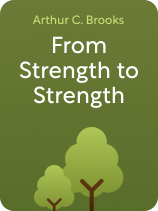

This article is an excerpt from the Shortform book guide to "From Strength to Strength" by Arthur C. Brooks. Shortform has the world's best summaries and analyses of books you should be reading.
Like this article? Sign up for a free trial here.
Are you in (or approaching) the second half of your life? What deliberate mindset change should you make in order to continue thriving?
In From Strength to Strength, Arthur Brooks says that, as you get older, your professional skills could start to decline and you might no longer be able to succeed in your current job. Despite this, with the right mindset, the second half of your life can be even happier and more meaningful than the first.
Keep reading to learn how to redefine success in later life and find fulfillment in new ways.
Redefine Success in Later Life
Brooks says that, to feel truly happy and content in the second half of your life, you need to rethink your goals. Chasing career achievements, wealth, and prestige won’t be satisfying forever. That’s why, instead of continuing to focus on professional success, you must redefine success in later life. You should dedicate yourself to life success—in other words, living a well-rounded life full of contentment and love.
Achieving life success is all about finding a healthy work-life balance. In other words, don’t give up on work, but don’t neglect other areas of your life either: Spending time with your family and friends and practicing your faith (if any) contributes to your life success. You’ll know you’ve found life success when your happiness doesn’t rely on the dopamine burst you get from a personal achievement; instead, contentment will be your normal state of being.
(Shortform note: In Eat That Frog!, Brian Tracy gives some specific advice on establishing a better work-life balance, which may help you to achieve life success. First, he says to determine the three most important things you do at work—you’ll probably find that a relatively small number of your duties produce the majority of your value to the company. Do those three things first each day, so instead of getting bogged down in countless smaller tasks, you’ll have time and energy after work to do what makes you happy. Also, set personal goals in three areas: financial/career, relationship/family, and health/fitness. Pursuing those goals, instead of devoting all your time to work, will help you build a balanced and satisfying life.)
| Is Happiness a Choice? Brooks discusses numerous choices you can make to become happier in your later years, such as choosing different life goals and career paths. However, some research shows contentment may simply come from choosing to pay attention to things that make you happy. Some surveys and studies have shown that seniors tend to be happier than younger adults, which goes against the common assumption that people must become less happy as their abilities decline and the end of life draws closer. Further research into why seniors seem happier than their younger counterparts showed that they often focus on positive things and disregard negative things. For example, one study showed that older people tended to look away from unpleasant images and paid more attention to pleasant images than younger people who were shown those same images. Researchers found the same trend among young people with terminal illnesses and, in some cases, among people who witnessed tragedies like the September 11 attack on the World Trade Center. This suggests that people tend to focus on things that bring happiness when they come to understand that their lives could end at any time—a realization that’s often a result of aging but can also come from other sources. In other words, when people realize that their time is limited, they often shift their goals to maximizing their happiness in whatever time they have left. In short, it’s possible that by making conscious decisions about where you direct your attention, you can make yourself happier. |
Let’s discuss three specific ways Brooks says you can find life success: by prioritizing your eulogy values, nurturing your connections with other people, and finding (or practicing) a system of beliefs that’s meaningful to you.
Strategy #1: Find Life Success Through Your Eulogy Values
One way to pursue life success is to start prioritizing what Brooks calls eulogy virtues—so-called because they’re qualities that people might talk about at your funeral.
Eulogy values might include always helping people who need it, standing by your loved ones during difficult times, or lighting up a room with your unique sense of humor. Note that, rather than one-time achievements, these tend to be character traits and lifestyle choices; in other words, things that you do continuously throughout your life. These are things that will bring you lasting happiness and fulfillment.
In contrast, many people (especially young people) tend to focus on their résumé virtues. These are accomplishments that you might use to impress others—for example, holding a prestigious job title, winning a world-class competition, or earning a degree from a highly selective school.
Brooks says that these kinds of accomplishments only bring you fleeting, worldly rewards like money or fame. Furthermore, those rewards fade quickly unless you keep accomplishing more and more—which, remember, will become more difficult as you age. Anything that requires you to compete against or compare yourself to others probably falls into this category.
Strategy #2: Find Life Success Through Your Connections
Another key theme in Brooks’s suggestions for pursuing life success is that competing against others brings professional success while connecting with others brings life success.
Brooks believes that nobody can live purely as an individual. People naturally support one another emotionally, intellectually, and even materially. The more you embrace that interconnectedness—the more you decide to love and support the people around you and accept their love in return—the happier you’ll be.
Conversely, trying to go against that natural order by isolating yourself or selfishly chasing professional success your whole life will leave you stressed, lonely, and unhappy.
According to Brooks, some research suggests healthy relationships are the single most important factor in maintaining your physical, mental, and emotional health as you age. While other factors, like body weight and alcohol consumption, did affect people’s overall well-being, the healthiest and happiest people—almost without fail—were the ones who were most satisfied with their relationships.
Strategy #3: Find Life Success Through Your Beliefs
Finally, Brooks says faith is crucial to happiness later in life, citing numerous studies suggesting that religious and spiritual people tend to be happier and healthier than their atheist counterparts. He thinks this is because faith and spirituality help to put your life into perspective. They take your focus off yourself and your problems; instead, you start thinking about the nature of the universe, the purpose of life, and your part in making the world a better place for everyone.
Brooks adds that religious leaders have known about the path to life success for millennia. As an example, he relates an ancient Hindu teaching that says there are four stages of life, each with a particular goal. At around 50 years old, you enter the third stage of life, called vanaprastha. The literal translation of this stage is “retiring into the forest,” but vanaprastha really means that you begin to leave behind your pursuit of wealth and professional success in favor of developing your spirituality. This is meant to be preparation for the last stage of life called sannyasa, when you fully renounce worldly concerns like wealth and spend the final years of your life pursuing enlightenment.
However, belief in the divine isn’t the only way to achieve life success. Brooks says that people who reject religion and spirituality can often find meaning in philosophy—it has many of the same benefits, such as pulling your attention away from selfish pursuits, instead encouraging you to seek happiness by living well and making the world better.

———End of Preview———
Like what you just read? Read the rest of the world's best book summary and analysis of Arthur C. Brooks's "From Strength to Strength" at Shortform.
Here's what you'll find in our full From Strength to Strength summary:
- Why our professional skills start to decline as we get older
- How second half of your life can be even happier than the first
- How to find a new career path that suits your changing skill set






